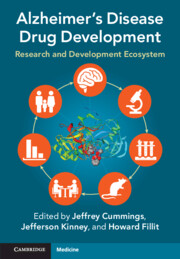Book contents
- Alzheimer’s Disease Drug Development
- Alzheimer’s Disease Drug Development
- Copyright page
- Dedication
- Contents
- Contributors
- Foreword
- Acknowledgments
- Section 1 Advancing Alzheimer’s Disease Therapies in a Collaborative Science Ecosystem
- Section 2 Non-clinical Assessment of Alzheimer’s Disease Candidate Drugs
- Section 3 Alzheimer’s Disease Clinical Trials
- Section 4 Imaging and Biomarker Development in Alzheimer’s Disease Drug Discovery
- Section 5 Academic Drug-Development Programs
- Section 6 Public–Private Partnerships in Alzheimer’s Disease Drug Development
- 40 Alzheimer’s Disease Neuroimaging Initiative
- Section 7 Funding and Financing Alzheimer’s Disease Drug Development
- Index
- References
40 - Alzheimer’s Disease Neuroimaging Initiative
from Section 6 - Public–Private Partnerships in Alzheimer’s Disease Drug Development
Published online by Cambridge University Press: 03 March 2022
- Alzheimer’s Disease Drug Development
- Alzheimer’s Disease Drug Development
- Copyright page
- Dedication
- Contents
- Contributors
- Foreword
- Acknowledgments
- Section 1 Advancing Alzheimer’s Disease Therapies in a Collaborative Science Ecosystem
- Section 2 Non-clinical Assessment of Alzheimer’s Disease Candidate Drugs
- Section 3 Alzheimer’s Disease Clinical Trials
- Section 4 Imaging and Biomarker Development in Alzheimer’s Disease Drug Discovery
- Section 5 Academic Drug-Development Programs
- Section 6 Public–Private Partnerships in Alzheimer’s Disease Drug Development
- 40 Alzheimer’s Disease Neuroimaging Initiative
- Section 7 Funding and Financing Alzheimer’s Disease Drug Development
- Index
- References
Summary
The Alzheimer’s Disease Neuroimaging Initiative (ADNI) is a longitudinal, observational study initiated in 2004 with the aim to develop and validate biomarkers for Alzheimer’s disease (AD) trials. From its inception, ADNI has been a model of a public–private partnership, with industry partners involved not only through financial support but in a guidance capacity. Through the development of standardized methods, ADNI has collected imaging and fluid biomarker data from cognitively normal, early and late mild cognitive impairment, and AD participants which is available to qualified researchers without embargo. Moreover, these methods have been incorporated into companion studies worldwide. The data that have been collected have provided important insights into the progression of AD pathology over time, assists in understanding which biomarkers may be most useful in clinical trials and have facilitated the design of studies of disease-modifying therapies.
Keywords
- Type
- Chapter
- Information
- Alzheimer's Disease Drug DevelopmentResearch and Development Ecosystem, pp. 455 - 464Publisher: Cambridge University PressPrint publication year: 2022
References
- 2
- Cited by

